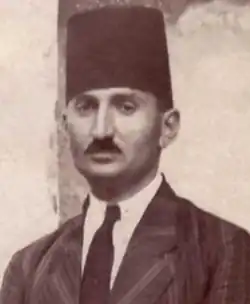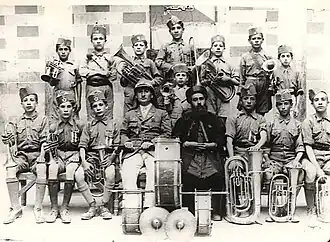Hanna Petros
Hanna Petros ܚܢܐ ܦܛܪܘܣ حنا بطرس | |
|---|---|
 Photographed image of Petros | |
| Background information | |
| Born | 1896 |
| Origin | Baghdad, Iraq |
| Died | 1958 (aged 62) |
| Genres | Syriac sacral music, Iraqi Maqams |
| Occupation(s) | Composer, singer, songwriter |
| Years active | 1920s–1950s |
Hanna Petros (Syriac: ܚܢܐ ܦܛܪܘܣ, Arabic: حنا بطرس) (1896 – 1958) was an Iraqi composer and a scholar. He wrote numerous books and treatises on oriental music, Iraqi Maqams and Syriac hymnody, and established a renowned conservatory in Baghdad. He is well known for creating the first musical records in Assyrian Neo-Aramaic[1] and for pioneering musical performance and composition in Iraq.[2]
Life and career

Hanna Petros was an ethnic Assyrian, born to a Chaldean Catholic family in Mosul in 1896.[1] After finishing preparatory school, he studied oriental music at the hands of an Ottoman army officer from 1914 to 1918 and was shortly employed at the Ottoman military band in 1918.[2] He subsequently worked as an instructor for scouting groups in Mosul in 1921, where he would also compose an anthem for the city.[3] Later in 1924, he was asked to compose music for the Iraqi army's marching bands,[4] and the following year, he would begin teaching music in Baghdad.[2]
Hanna Petros' main attention was concentrated on oriental music, composing pieces in both Iraqi Maqams and Syriac sacral music. In 1931, Petros released two phonograph records under the "His Master's Voice" trademark, titled "Baydakh d'Aturaye" and "Karuzuta d-Hasha".[5] The first record contained Assyrian nationalist songs while the second contained Syriac sacral hymns.
In 1936, Petros was asked to establish the Baghdad Conservatory[1] which quickly drew musicians who gained fame such as Jamil Bashir and later his brother Munir Bashir. Şerif Muhiddin Targan was later appointed as the conservatory's dean and Hanna Petros continued to play a major role in the conservatory.[4] It was then that he wrote most of his books. Moreover, he often appeared on the national radio to perform some of his musical works. In 1941, Petros founded the "Iraqi Police Music Band".[5]
Petros also served as a deacon in the Chaldean Catholic Church.[1][3] During his lifespan, he also published many literary works regarding music, including Principals of Music Theory and The Book of National Anthems.[2][3]
Hanna Petros died after a heart attack in 1958 at the age of 62, and was buried in Baghdad.
Personal life and death
In 1929, Petros married Maryam Daoud Martha from Mosul and had four children, namely Bassam Hanna Petros, who would also become a musician.[3][6] He was also fluent in Arabic, Assyrian Neo-Aramaic, French, Turkish, and English.[6]
Petros died after a heart attack in 1958 at the age of 64, and was buried in Baghdad.
Discography
As composer/performer
- Caruzutha d Hasha (Qdom Shapir, Hymn, 1931)[7]
- Geyassa (Hymn, 1931)
- Baydagh d-Ature (National Song, 1931)
- Bmani Mnawnakh (National Song, 1931)
References
- ^ a b c d Lang, Esther (11 April 2025). Banyamin, Brian (ed.). "Hanna Petros". auaf.us. Lincolnwood, Illinois: Assyrian Cultural Foundation. Retrieved 19 July 2025.
- ^ a b c d "حنا بطرس". متحف التراث السرياني (in Arabic). Syriac Heritage Museum. 10 November 2022. Retrieved 20 July 2025.
- ^ a b c d امجد, ايهم (1 May 2022). "دور الكلدان الاشوريين السريان في نشأة الموسيقى العراقية المعاصرة وتطورها". الثقافة السريانية (in Arabic). Retrieved 20 July 2025.
- ^ a b Al-Jabouri, Kamil Salman (2003). معجم الأدباء من العصر الجاهلي حتى سنة 2002م [Dictionary of Writers from the Pre-Islamic Era until 2002 AD]. Vol. 2. Dar Al-Kotob Al-Ilmiyyah. p. 278. ISBN 978-2-7451-3694-7. LCCN 2003489875. OCLC 54614801. OL 21012293M.
- ^ a b Cherie, Moneer (17 February 2017). "Oldest Assyrian Gramophone records from Iraq". news.qeenatha.com. Qeenatha. Retrieved 19 July 2025.
- ^ a b "الراحل حنّا بطرس جزء من تاريخ الموسيقى في العهد الملكي". Addustour. 28 September 2010. Archived from the original on 28 March 2012. Retrieved 31 July 2011.
- ^ "Hanna Petros". Qeenatha Music. Retrieved 19 July 2025.